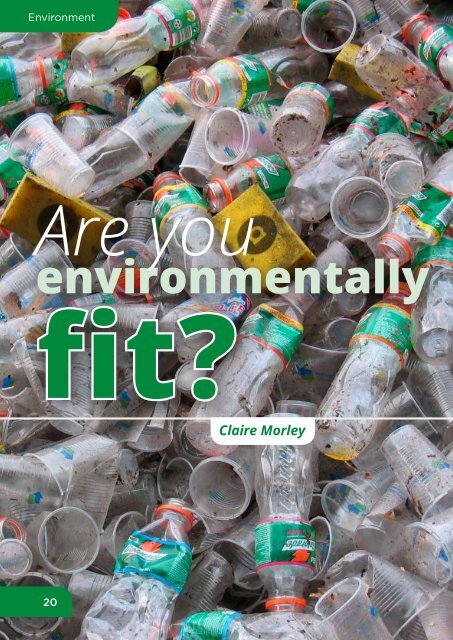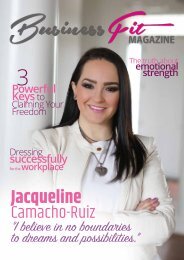Business Fit Magazine Eline Pedersen
In this issue Eline Pedersen., chiropractic, share her story with us. Read how to motivate your team from MaLish Global, helping you to target the best results for your employees, customers and stakeholders. Olga Stepien tells us why it Pays for Women to be Financially Independent and we look at What is Spiritual Practice, as well as many more informative and inspiring articles for the entrepreneur.
In this issue Eline Pedersen., chiropractic, share her story with us. Read how to motivate your team from MaLish Global, helping you to target the best results for your employees, customers and stakeholders. Olga Stepien tells us why it Pays for Women to be Financially Independent and we look at What is Spiritual Practice, as well as many more informative and inspiring articles for the entrepreneur.
You also want an ePaper? Increase the reach of your titles
YUMPU automatically turns print PDFs into web optimized ePapers that Google loves.
Environment<br />
Are you<br />
environmentally<br />
fit?Claire Morley<br />
The last few months have shown a flurry of activity<br />
by governments and corporations, all keen to<br />
prove they are environmentally responsible in a<br />
world which is becoming increasingly overrun by<br />
plastic.<br />
David Attenborough and the final episode of the<br />
Blue Planet II series proved to be a huge wakeup<br />
call to many, suddenly realising how much<br />
damage single-use plastic has been doing to<br />
our planet. Calls for greater and better recycling<br />
facilities have echoed around the globe, but is that<br />
really the answer? The answer is a resounding NO!<br />
It isn’t the solution that many believe it to be.<br />
Much of the single-use plastic in our lives is not<br />
recyclable and items like water bottles will be<br />
around on our planet for hundreds of years,<br />
breaking down into tiny particles, finding their<br />
way into the sea, eaten by marine life and<br />
before long consumed by us.<br />
The amount of plastic produced in a year<br />
is roughly the same as the entire weight of<br />
humanity.<br />
The number of bags used every year by<br />
Americans tied together would reach around<br />
the Earth’s equator 773 times<br />
There is more microplastic in the ocean then<br />
there are stars in the Milky Way<br />
Over the last ten years, we have produced<br />
more plastic than during the whole of the last<br />
century<br />
Plastic chemicals can be absorbed by the<br />
body – 93% of Americans test positive for<br />
BPA (a plastic chemical).<br />
40% of plastic produced is packaging, used<br />
once then discarded – 161 million tons a year<br />
44% of seabirds are being documented with<br />
plastic in or around their bodies.<br />
Why not recycling?<br />
Reducing the amount and types of plastic<br />
we use, would be a better solution. Recycling<br />
gives us a false sense of security. Believing in<br />
the power of recycling can in fact increase the<br />
consumption of plastic, through the conviction<br />
that it will all be recycled. That’s not to say<br />
recycling should be completely disregarded,<br />
but ultimately, we need to investigate ways to<br />
reduce relentless, unnecessary waste – plastic<br />
or otherwise. We must alter how we live, to<br />
consider how much we waste, rather than<br />
what we waste.<br />
How you can help as an<br />
individual.<br />
1. Stop using plastic bags – take your own<br />
bags (or even make your own shopping bags<br />
by recycling tee-shirts https://www.youtube.<br />
com/watch?v=Cin_wLIW9S8)<br />
2. Change your Toothbrushes and razors –<br />
buy bamboo toothbrushes and metal razors.<br />
3. Try Shampoo soap – not only environmentally<br />
friendly, but a great deal cheaper. What do you<br />
think people used before shampoo came in<br />
plastic bottles?<br />
4. Buy loose fruit and vegetables – have a<br />
supply of netting bags (or better still make<br />
your own) and only purchase loose fruit<br />
and vegetables. The bags are reusable and<br />
washable.<br />
5. Choose glass jars over plastic containers in<br />
the supermarket.<br />
6. Ditch tea-bags in favour of loose tea and<br />
teapots. Tea bags contain plastic.<br />
7. Carry a reusable straw for your iced coffee.<br />
8. Take your own take-out cup to the coffee<br />
shop and your own containers to the takeaway.<br />
9. Spread the word - Encourage others to<br />
ditch single use plastics.<br />
20 21





